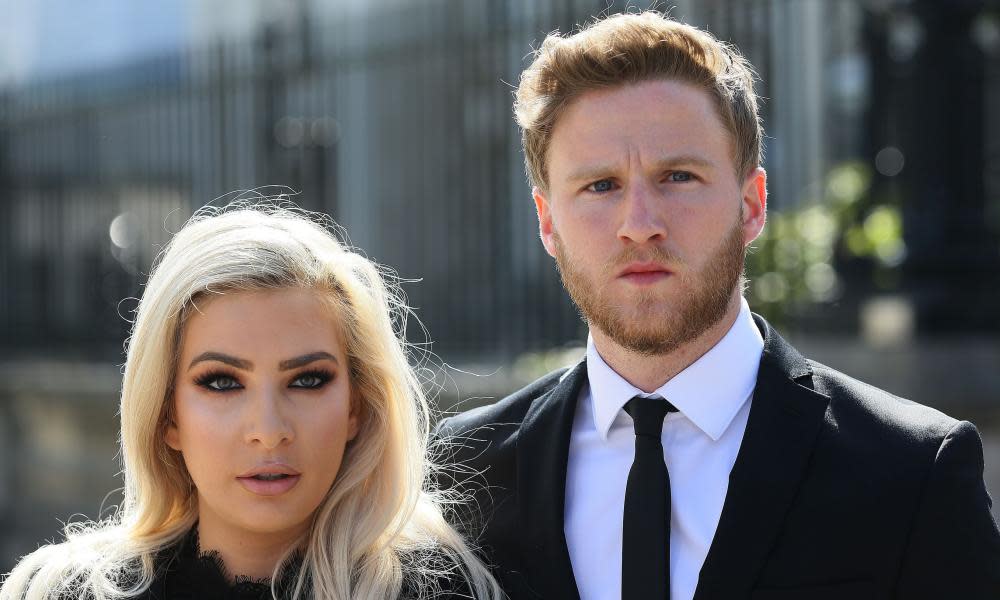Footballer and model seek legal humanist wedding

A footballer and a model are mounting a court challenge to have their upcoming humanist wedding recognised as legal, arguing that they are being denied the rights given to religious couples.
Laura Lacole is marrying the Leeds United and Republic of Ireland midfielder Eunan O’Kane in Northern Ireland next month. The couple, both humanists, want a ceremony that reflects their beliefs, but the only legal options available to them are a religious or civil service.
Lacole, 27, and O’Kane, 26, took their case to Belfast high court on Friday, arguing that they faced discrimination under European laws protecting freedom of belief. If they lose their case, the wedding will go ahead, but they will be obliged to have a separate civil registration in order to make their marriage legal.
Under the law in England, Wales and Northern Ireland, non-religious weddings must be conducted at a local authority registry office or an approved and licensed wedding venue. Any other non-religious ceremony is not legally recognised without an additional civil registration service.
A humanist wedding is tailored to meet an individual couple’s requirements, beliefs and values, without a set script. It can take place at any venue.
According to the charity Humanists UK, “many of us who aren’t religious are looking for a wedding that is more flexible and personal than a civil or register office ceremony”.
In Scotland, humanist weddings have been legal since 2005. Eighty such weddings were conducted that year, but the number rose to almost 4,300 in a decade, exceeding those conducted by the Church of Scotland.
Humanist weddings are also legally recognised in the Republic of Ireland, New Zealand, Canada, Australia and some US states.
Before the hearing, Lacole said she and O’Kane “want to have an intimate marriage ceremony which is encompassing of who we are as individuals, the values we hold, how we go about life and our viewpoint on life.
“We want it to be personal to us and the love we have for each other. So of course, not being able to have legal recognition for that ceremony is an issue for us, and we want to do something about that for ourselves and other people in our position.”
In court, the couple’s lawyer, Steven McQuitty, said the case was of “huge public interest” as they wanted the same protection given to those of different belief systems.
“Religious people from pagans to Free Presbyterians and everything in between enjoy a substantial legal privilege under law,” he said. “In a sense, the state gives its legal blessing to such marriages, [but] denies the same privilege to equally valid groups.”
As the law stood in Northern Ireland, the couple’s wedding on 22 June would be “legally meaningless”, McQuitty said.
Northern Ireland’s attorney general, John Larkin, argued that humanist elements could be incorporated into a civil ceremony. “That blunts and weakens the case for a separate ceremony,” he told the judge.
The case is backed by Humanists UK, whose chief executive, Andrew Copson, said: “Religious people currently have the legal right to marry in a ceremony that reflects their most fundamental views of the world, but humanists cannot do likewise.
“They are denied legal recognition for a bespoke personalised ceremony that reflects the values of the couple involved, that they share with the celebrant and that is built around them.
“That is why there is a need for legal recognition to be extended to humanist marriages, so that couples can enjoy such a wonderful start to married life, free from discrimination while doing so.”
Outside court, Lacole said: “We hope that we get a good verdict which means that we can have the wedding ceremony that we want to have. If we don’t get it, we want to appeal so we can give other people the opportunity to have the wedding ceremony that they want.”
O’Kane and Lacole, a vice-chair of Atheists NI, have invited 250 guests to their wedding. “It will be a traditional wedding in a venue that has sentimental value for us. I’ll be wearing a white dress and there’ll be bridesmaids and a page boy,” Lacole told the Guardian.
“It’s been a lot of stress to organise the wedding and take on a legal case at the same time. I’m optimistic, our case is solid, and I can’t see any just reason not to be given legal recognition. We don’t want to take rights away from anyone else, we just want our beliefs recognised. You hold your beliefs dear, it’s how you define and interpret your life. We just want a wedding that embodies our beliefs.”
Judgment was reserved.

 Yahoo News
Yahoo News 
